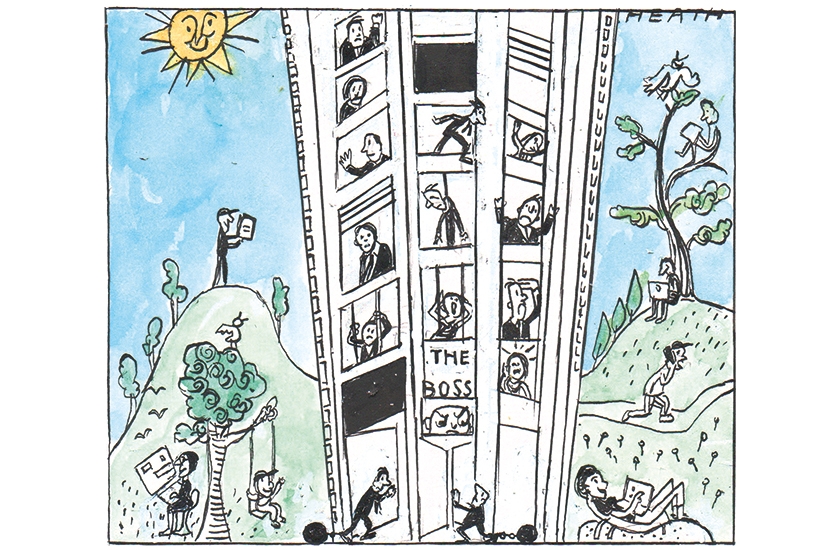The most useless technology is the one you invent but fail to exploit. The Incas invented the wheel, but seem only to have used it on toys. Hero of Alexandria designed the first steam engine in the 1st century ad, but it was seen as a gimmick. The technological opportunity to escape from city-center offices has been stuck in a similar limbo between invention and implementation.
In the 1970s, Nasa engineer Jack Nilles envisaged ‘teleworking’ from local work centers. In 1984, the Times reported that tele-commuting was the ‘magical buzzword’ on the US microcomputing scene. In the 1990s, the UK had 200 ‘telecottages’: rural workspaces with computers, communications and social support. More recently, there has been a proliferation of latte-sipping freelancers hunched over MacBooks at coffee shops and WeWorks.
Despite all the fanfare and substantially better technologies, little has changed in recent decades. Last year, just 5.1 percent of adults in employment worked primarily from home in the UK, according to the ONS. This was barely an increase from 4.3 percent in 2015. A larger number — about 12 percent — spent some of the week working from home.
Then, suddenly, a plague descended. Overnight there was a mass exodus from skyscrapers. City streets emptied. The cafés and sandwich shops closed. Millions began working from home (now known simply as ‘WFH’). Half of employed adults are now working from home. And to almost everyone’s surprise, it works.
‘The notion of putting 7,000 people in a building may be a thing of the past,’ Barclays CEO Jes Staley said a few weeks ago. Mark Zuckerberg has announced that half of Facebook’s employees will work from home within a decade. Many businesses, from Twitter to BT call centers, have already announced their employees can opt to work from home permanently.
Pandemics have lasting consequences. John Snow’s discovery of the link between dirty water and cholera led to investment in clean water and sewage systems. The 1918 Spanish flu stimulated projects to clear slums.
COVID-19 will change how humanity works. Lockdown has revealed that a large part of the busyness of business is driven by the need to signal commitment (presenteeism), rather than the creation of value. Many people have realized that the most stressful part of working is not the worthwhile work itself but the accompanying worthless bustle. We have seen how commuting is frenetic and often unnecessary. In the future, perhaps people will go into the office when they need to or want to, rather than simply because they must. Meetings and conferences will offer a remote option by default.
We should not underestimate the lasting effects of this change in the ‘default settings’ of behavior. One of the magical properties of Coca-Cola is that anywhere on Earth — from an African beach shack to a Michelin-starred Paris restaurant— you can casually ask for a Coke with the confident assumption that it is their obligation to provide it. If they don’t have it in stock, it is their fault, not yours. The same does not apply when you ask for Dr Pepper. Remote working has gone from being Dr Pepper to Coke in the space of three months.
It’s an ill wind that blows no one any good. And we believe that the greater workplace flexibility driven by a pandemic can translate into a boon for humanity. It should bring the opportunity to significantly increase employee freedom and autonomy; equally important, if implemented well it could significantly increase productivity. There are also many welcome knock-on effects: the potential to reshape the design and location of workplaces and homes, to better spread the wealth created by mega-cities, to improve the lot of working women and the elderly — and much more.
In short, it is time for a more sensible and nuanced reassessment of the relationship between work, leisure, money and freedom, and how this relationship might change for the betterment of everyone.
Marx claimed employment was exploitative: capitalists steal the ‘surplus labour’ from the proletariat. Free-market liberals argue that work is mutually beneficial: labour in exchange for income. But the reality has always been more complicated.
Work brings benefits as well as costs to the people who perform it: our work provides us with an identity, a sense of meaning and purpose, as well as friends and even spouses — and sometimes refuge from spouses, of course.
Nevertheless, work can undermine our immediate freedom. It takes up five-sevenths or so of our available sunlight (during much of the year, we spend most of the daylight hours indoors). There are even elements of work — such as commuting or dressing up every day — that seem to add limited value for a great deal of personal cost.
The barrier between work and free time is already blurring. NordVPN has found people are logging on to their computers earlier and logging off later. But people are also taking more breaks throughout the day — taking care of kids, going for runs, enjoying the sunshine.
Work and life are integrated: video calls give insight into people’s living rooms, dogs jump on to screen and uninvited children interrupt calls. This isn’t a distraction; this is what human life is all about. Despite concerns about the loss of barriers, overall, many people are positive. A recent survey by Deloitte found 70 percent of employees were enjoying the experience of working from home, while just 10 percent have had a negative experience.
Even more importantly, for employers at least, working from home could help improve stagnating worker productivity. This makes it a win-win. Lockdown shows that our habit of going into an office every single day may provide only limited benefit. Traveling takes up immense time and energy. Commercial real estate is hugely costly. Constant emails, rather than brief video calls, slow everything down. A 10-minute meeting is often the fastest way to resolve any question. There is never a shortage of virtual meeting rooms. And, when you no longer have to eke out a meeting to a full hour to make everyone feel it was worth the journey, meetings can be briefer too.
Managers may also find that giving employees more freedom makes them more hard-working. The New York Times bestselling author Daniel Pink argues humans are motivated by autonomy: the ability to direct their own lives. Free-range humans produce better eggs. An experiment led by the economist Nicholas Bloom found homeworking increased performance by 13 percent in a large travel agency. It also improved worker retention.
This could be because creativity flourishes out of the office. Revealingly, Isaac Newton did his most important work at home after being forced to leave Cambridge because of bubonic plague. He was spending his lockdown sitting under a tree at Woolsthorpe Manor in Lincolnshire.
The physical layout of the office itself could also be a problem. The office was invented during the industrial era. It mimics factories: big rooms with long rows of desks. The modern open-plan office — a design largely introduced to reduce costs, with a narrative about ‘teamworking’ tacked on later — is an assault on autonomy. In an office you can close the door or invite people to join you. In an open-plan setting, you are trapped in a permanent, inescapable limbo somewhere between sociability and solitude, with the virtues of neither.
Many find being constantly on display to be demoralizing. A Harvard Business School study by Ethan Bernstein and Stephen Turban investigated two Fortune 500 companies’ change to open office spaces. ‘Contrary to common belief, the volume of face-to-face interaction decreased significantly (by around 70 percent) in both cases, with an associated increase in electronic interaction.’
This crisis is an opportunity to improve workplaces into more variegated, welcoming places. Fewer staff in the office every day means not only cost savings on rents, but much less need to squeeze people in. Offices can become campus-like: part coffee shop and bar for spontaneous meetings, meeting rooms for organized activities, and a library for those who need to concentrate — or escape their homes.
While offices of the future will be more homely, homes of the future could be more worky. Real-estate agents could start advertising spaces that can easily be converted for work. This might ultimately change where people want to live, and what homes they want to live in.
Young employees in cities are paid relatively well, but they quickly lose as much as half their after-tax salaries in rent and travel costs. They spend their lives in cramped quarters with multiple roommates. With the commute reduced from five days a week to four or three, the need to live centrally diminishes. Notably, about 250,000 people left London when lockdown was called, according to a University of Oxford study. Most will return; some will not.
All this will change demands on transportation. People could exercise their newfound freedom to travel at less crowded times of day, using the time to be more productive en route. Urban rail and bus might need to be improved for all the workers commuting from further out.
On the environmental side, less car travel into work will reduce emissions. But higher car ownership, as well as the lack of quality home insulation and more demand for heating homes during the day, might counterbalance some of these benefits. Employers might be expected to fund at least some of the costs of WFH: chairs, desks, heating and internet access. A Swiss court in late May went as far as ordering a company to pay part of the rent of a former employee who worked from home — despite no prior agreement on compensation.
The opportunity to avoid stressful and tiring commutes may encourage older workers to stay in the workforce longer — thereby helping to alleviate some of the financial pressures of an aging population. How many people retire not so much because they want to stop working, but because they want to stop commuting?
Of course the office will not disappear — nor should it. Humans are social animals. Many enjoy the office environment. Some need it. We thrive on random encounters and receive status from showing off. Human contact cannot be wholly replaced by screens. It is also easier to work from home now precisely because of our pre-existing relationships formed from working in person. These must continue to be built.
[special_offer]
And, more controversially, not everyone will enjoy this luxury. White-collar jobs can be done from anywhere. Factory, construction, hospitality, retail and healthcare work must be done somewhere. There could also be tension if those who work from home feel that they do not get the same opportunities for advancement as those in the office.
Not all places will benefit equally. Britain for example (a net exporter of services, where almost everyone speaks English) sits on the Greenwich Meridian: a time zone where you can speak to Singapore in the morning and Los Angeles in the afternoon. As such, it is disproportionately well placed to profit.
In the past, working remotely has been seen as a concession, not a reasonable alternative. In the case of flexible working, the slow process of normalization has been hugely accelerated by epidemiological necessity. Suddenly a range of new working behaviors has been made possible. Some of these behaviors will not work for everyone, and some will work for nobody. But many will work well for both employees and businesses. These surely deserve to survive.


















